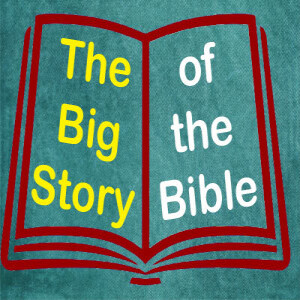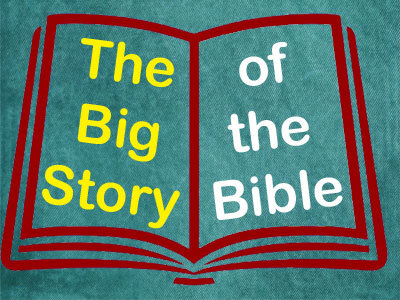
432.5K
Downloads
3364
Episodes
G’day and welcome to Partakers Christian Podcasts! Join us for uplifting Bible teaching, inspiring readings, heartfelt worship, powerful prayers, and fascinating church history. Whether you’re new to faith or growing deeper in your journey, we’re here to encourage and equip you. 🎧 Tune in, interact, and be inspired—wherever you are in the world.
G’day and welcome to Partakers Christian Podcasts! Join us for uplifting Bible teaching, inspiring readings, heartfelt worship, powerful prayers, and fascinating church history. Whether you’re new to faith or growing deeper in your journey, we’re here to encourage and equip you. 🎧 Tune in, interact, and be inspired—wherever you are in the world.
Episodes

Saturday Nov 11, 2023
The Big Story - Part 1
Saturday Nov 11, 2023
Saturday Nov 11, 2023

Big Story - Act 1 - Creation
with Roger Kirby
Very probably your answer is either a “soap” (a series of episodes telling the story of a family or a group of people) or a series of linked episodes solving various crimes, containing the same central characters. Both of these are stories – and we love stories. When a girl meets a new fellow she may well ask “ tell me about yourself”, by which she does not mean the sort of list of accomplishments that would be appropriate in a job application. She wants to hear about things he has been involved in, people he knows or has met, strange things that have happened to him. Quite how we come to understand someone on the basis of disconnected small stories like that is not at all obvious.
In His wisdom God has told us about himself through stories, some connected, some disconnected, some big, some small. Quite how we can come to understand something about God this way is not clear but we do. By story I do not mean some thing that is not true. Scholars call true stories ‘narratives’ but that is too posh a word for us!
The Bible is one huge story, the greatest story ever told. But we tend to read it and hear about it only in small disconnected chunks and have never heard any attempt to put the most important parts of it together as a big, continuous story. This set of studies aims to put that right! (Even although much modern thinking rejects the idea of big stories, thinking they only function as a method of control. But then perhaps God knows better than the moderns.) at best this story will only partly succeed because the Bible is so infinitely varied everyone sees different, hidden depths in it.
There are 5 major parts to the story – I will call them Acts, as in a play, some of them subdivided into Scenes. These are headed: the Creation, the Fall, Israel, Jesus and the Church. I am going to tell the story as I see it. There must be a nearly infintite number of ways the Story could be told. This is mine. I hope you enjoy and learn from it.
Very obviously the first one is Creation. In 5 days God created the non-human world. Here that is in Genesis 1: 1 – 23: “In the beginning God created the heavens and the earth. Now the earth was formless and empty, darkness was over the surface of the deep, and the Spirit of God was hovering over the waters.
And God said, “Let there be light,” and there was light, then a separation on the second day, vegetation on the third day, visible lights on the fourth day, living creatures on the sea and the air on the fifth day and on the ground on the sixth day. And – we are told of all these things that - God saw that it was good..
No part of Scripture has been subjected to more argument than these verses. I am not going to get into that argument. Just let me say that it is not true that we have but one God-given source of information about what happened. We have two: this scripture and the natural world round about us, both God-given as Psalm 19 clearly says: Psalm 19: 1, 4, 7, 8a: It starts off saying “The heavens declare the glory of God; the skies proclaim the work of his hands. Day after day they pour forth speech; night after night they reveal knowledge. Yet their voice goes out into all the earth, their words to the ends of the world.”
But then it goes on to say: “The law of the Lord is perfect, refreshing the soul. The statutes of the Lord are trustworthy, making wise the simple. The precepts of the Lord are right, giving joy to the heart. The commands of the Lord are radiant, giving light to the eyes.”
There is no conflict between Science and the Bible, as is often suggested. There cannot be because they are different sorts of things. Science is man’s understanding of the raw data of the natural world. The Bible is also raw data. Theology and Bible Study are man’s understanding of what the Bible says. Science certainly can, and does, conflict with theology and our understanding of the Bible. The natural world and the Bible are two different types of raw data, both God-given and therefore not in conflict. The natural world is our best source of information about how and when God created. The Bible is our only source of information about by whom and why. Hundreds of years ago they used to talk about the ‘perspicuity of scripture’. By that they meant that it was easy to understand, transparent to everyone, even every ordinary person. You don’t have to be a theological genius to know what it is saying to you. (Obviously the more you know about the context of scripture the better, but you don’t have to go to Bible College to work out what it is all about.) The same thing is true of the natural world. You don’t have to be a scientific genius to know what the world is telling us about God. It is not immediately obvious that we ordinary, created human beings can understand the ways of the Lord, in both his written word and his created world, but it is so. It is important to keep a balance between these two so different lines of thinking about the creation of the world and all that is in it.
In the beginning God created the heavens and the earth and everything that is in them. So the answer to “by whom” is God, though what exactly that means we shall only get a glimpse of even when we have looked at all the Big Story of the Bible. This is emphasized in quite a subtle way when those first few verses refer to the sun and the moon as just ‘those lights in the sky’ not even giving them names. That is clearly done to avoid any least suggestion that they had anything to do with the creation, since they were considered to be gods in most ancient religions.
“Why” is answered in the remainder of Genesis Chapter 1: verses 24 – 31. It is for the glory of God and then, quite astonishingly, for us, for mankind. We are not just specially developed animals who happen to have developed much further than any other creature. We are those for whose blessing and enjoyment everything was created. Wow!
But don’t jump to the wrong conclusion. It is still God’s world. Sadly, mankind seems to have decided that it can do what it likes with it: rip it apart, use it up, dirty it, pollute it, empty chemicals into its rivers etc. in the hope that it will all work out all right in the end. One day the day of reckoning will come.
We, and we alone, are made in the image and likeness of God. That means, I think, many things. We alone can reason, can think, can understand – amongst other things that death lies inescapably ahead of us – can love beyond the bounds of sexual desire, can think a long way ahead of the consequences of our actions – at least when we want to do so.
To put it in very modern language, our brains, unlike those of any other creature on this earth, are, in computer speak, almost completely full of RAM, not the ROM that fills animal heads. RAM is random access memory where there is no information until some is put there; ROM is read only memory where the information has already been put there and cannot be changed or developed much. We humans, on the other hand, have to learn to speak, to walk, to understand just about everything concerning the world around us. Our brains have to learn, to be filled with knowledge. Animals are born with most of the things they need to know already implanted in their brains. That is a huge and wonderfully significant difference.
So what?
Those two words signal my comment as to what the immediate practical implication of the this passage, this part of the Big Story, means for us – for you and me – today.We are created in the image of God. Sometimes Christians get so excited by the next two chapters of Genesis that they think of everybody as simply “sinners” to the exclusion of these important and thrilling facts. Those who are not Christians, just like those who are, have these two directly conflicting aspects to their lives. We are both made in the image of God and fallen sinners. Sometimes one dominates; sometimes the other. So your unbelieving neighbour one side may be the most delightful, helpful, loving person you could wish to meet. Your unbelieving neighbour the other side may be the most unpleasant character, impossible to carry out any sort of decent conversation with, always getting into arguments and fights and probably a thief. Those are the ways we naturally are. Neither person is acceptable to the LORD God if they have made no attempt to enter into relationship with Him. That is the way we naturally are. We need to hold firmly in our minds our understanding of human beings as both God images and sinners and be careful to understand our world in the light of those two facts.
Only as a consequence of the death, and resurrection of Jesus and the gift of the Holy Spirit to those who have set out to follow him can we be any different.

No comments yet. Be the first to say something!